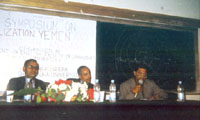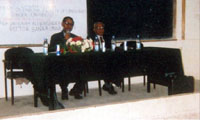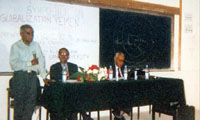
Department of English , Faculty of Languages, Sana’a University, organizes a symposium on …Globalization, Yemen and the English languague [Archives:2005/806/Education]
January 10 2005
 |
 |
 |
The symposium opened with recitations from the Holy Qura'an . Prof. Tariq Al-Jenabi,Dean ,Faculty of Languages welcomed the guests and delegates. In his address Prof.Jenabi explained the significance of the theme . He said the whole world has become a global village and this new situation calls for a readjustment. He felt happy that the English department has organized a symposium on this topic .He appreciated the efforts made by Prof. A. K. Sharma and Dr M A Shamsher and hoped that in future the department will be able to organize still bigger events. Dr Shamsher in his brief intervention explained how the arrangements for the symposium were made within record time.
Introducing the theme Prof. A K Sharma, Head, Dept of English , presented his paper on Globalization, Yemen and the English Language . He observed that the term globalization was used in several senses, but we must accept that this phenomenon has significantly influenced the society and higher education of every country and the Republic of Yemen is no exception. He further said that the importance of English language has considerably increased in the wake of globalization. We may now call it a global language . He noted that the myth of the ' native speaker' has been demolished and now the important criterion is that of intelligibility and comprehensibility. He ended his paper with the hope that this symposium would discuss the present status of English in Yemen in view of globalization.
It should also discuss the present and future needs of English in Yemen and whether the English departments in different universities in Yemen in their present form are capable of coping with and catering to the changing and expanding needs of English in Yemen. The discussion should also focus on whether the objectives of ELT need to be re-determined , curricula reframed , materials recast, methodology reviewed and the quantum of teaching increased. He also stressed that a large scale and broad-based analysis of the needs of English in Yemen is required and another highly focussed symposium needs to be organized to explore the issue further.
Prof D Thakur, Chairman, Dept of English, Faculty of Arts, delivered the Presidential address. He recalled how ,when he joined Sana'a university, he found only a few students interested in English. He noted that the situation has completely changed . Now there is a huge rush for admission to the English courses. By means of a fairy tale he underlined the importance of setting the goals and defining the objectives called for in the context of globalization . He said that English is now in the hands of the vast majority which uses it in the world . He added that almost one-third of Indians speak English. He said Yemen should produce its own teaching materials in English and develop a national test in accordance with the local needs .
Prof R.S Sharma read a paper on English studies in Yemen under the global perspective . An outline of the paper had been published in Yemen Times in July 2004. He explained the global perspective through a diagram and outlined the various aspects of English language teaching in the expanding perspective of Yemen, the Arab world , developing nations, and the global frame work. He made an attempt to describe the salient features of world English. Such as r-pronouncing, syllable distinctive and multi-choice. He made a strong plea for the inclusion of eminent authors from four groups -African, Carribean, African-American and Indian-Pakistani. He argued that these authors can make an intimate appeal to the Yemeni students because their society and cultures are close to Yemen -historically,culturally and socio-economically.
The next speaker was Prof Talib Abdul Rahman. He noted that the publication of ELT materials is a thriving industry and hinted at the vested interests . He observed that the factors behind the rise of English must be taken collectively. The most important thing is that English is the medium of the internet including the search engines which now can display required matter in thousands of internet pages.All this knowledge is accessible through the medium of English. We must prepare ourselves and the students of English for exploiting the vast resources of knowledge made available by the electronic media .
Dr Ayed Sarhan contended that globalization is something to be reckoned with and we cannot wish it away. He discussed in detail the positive and negative elements of globalization and felt that the local culture was under erosion and several topics in the text books of English , such as family planning , had no relevance in the Yemeni society .
Next speaker Prof R K Jayraman attempted a close analysis to expose the link between capitalism and globalization. He pointed out that the project of Council of Europe in English teaching has been widely accepted under the communicative approach, although the syllabi do not answer the requirements of Yemen .He laid emphasis on very careful planning and well-thought-out language policy. He further said that English is chiefly required by us as library language and so much for oral communication.
Dr Mohammed Othaman Naif contended that the process of globalization cannot be stopped . We must adapt ourselves to the new situation and concentrate on acquiring English for use in business career advancement .
Ms Najat Ali Al-Badani enlarged the scope and the format of the discussion by highlighting some of the ideas of Chomsky. She said language defines the very process of thinking. She added that English is the language of world community and ,as part of the world community, we must assign a central place to English in our studies . She observed that the task of learning English in the context of Yemen is fraught with difficulties such as lack of competent teachers and teaching aids. We must develop a fresh attitude to English.She suggested that English teaching should be made learner-centered and teachers should also realize their responsibility.
Next speaker Hanan Khusrouf expressed the opinion that globalization was full of challenges and also uncertainties. She agreed that English has become the working language of mass communication but there was also unwholesome Americanization vis-a-vis the native culture.
In his brief remarks Prof Thakur observed that the world was changing fast and we must adjust ourselves to the new situation .
The second session began with Prof Abdul Rahman Abdrabou as Chairperson. The first speaker Dr U K Mishra dwelt at length on the problem of standardization of Global English . He argued that like democratization ,Globalization is serving a purpose. He observed that English is used very widely and quoted McArthur to suggest that different varieties of English will co-exist for some time. He enumerated the process that are contributing to the development of Global English and that the earlier attitude of chauvinism has disappeared.
Dr Saleh Ahmad Saif traced the development of English language and its expansion throughout the world. In the modern age , English is used widely in many countries and it has enriched itself by tapping various sources . English was introduced in the south of Yemen much before it reached north Yemen. He pointed out the problems like poorly equipped teachers and low-quality students. He pleaded for an intensive course for weak students.
Next speaker Dr Rajesh Kumar focussed his attention on teaching writing skills. He said , on the one hand , globalization promoted the use of English and on the other English has become an instrument of globalization. Globalization ,according to him, demolished the national barrier and what is needed is to restructure and modernize writing courses in accordance with the new needs generated by globalization.Teachers are also expected to adjust themselves to the new situation. He ended by suggesting that , instead of regarding English as a foreign language ,we must treat it as an additional medium .
Dr M A Shamsher mooted the proposal of partnership between the university and western NGOs so far as the teaching of English was concerned . He explained that this will make it easier for the university to procure native teachers and modern teaching aids free of cost. He also informed the audience about the progress already made in this direction.
Dr. Abdul Hamid A M Shuja'a dwelt on the teaching of business English which is the call of the day because many multinationals have set up their offices and centres in Yemen and thus have given a new perspective to the requirements of English as a medium. There is a need , he said, to make the teaching of business English need -oriented . In his words , efforts should be made to bring the job market to the class-room .
Mr Khalid Al-Mawery focused his attention on computer English. He explained that we find English everywhere in the electronic media such as Windows 2000, Microsoft, internet,websites , web pages,etc.
The last speaker Mr Wasim Abdullah Jahaf argued for the introduction of Business English as a component in B A courses and suggested that a department of Tourism should be established in the Faculty of Languages. This will enable the faculty to train efficient tourist guides.
A report of the proceeding was presented by Prof R S Sharma in which he mentioned the contribution made by each speaker .
As a concluding item the participants agreed on certain recommendations and proposals to be treated as the final achievement of the symposium. It was suggested that these proposals be submitted to the university for consideration. The following recommendations deserve to be mentioned :
– Ability to use English is necessary for taking full advantage of globalization for Yemen.
– Necessary precaution must be taken in order to minimize the adverse effects of globalization in the Yemeni society and culture.
– Minimum general intelligibility of English must be ensured .
– Systematic efforts toward language planning must be undertaken.
– English as library language needs to be strengthened at various levels.
– Need-based courses should be framed especially at higher levels.
– Departments of English should enter into a partnership with suitable NGOs.
– Involving the market in the teaching of English in Yemen should be considered as an option- this includes industry- sponsorship of English courses.
Winding-up the proceedings, Dr Abdrabou in his Presidential remarks appreciated the efforts of Dept of English and praised the participants for their important contributions.
Dr M A Shamsher presented the vote of thanks in which he lauded every one who made a contribution to the success of the symposium. He especially mentioned Tadhamon International Islamic Bank , Sana'a which generously provided financial support without which it would have been impossible to organize the event.
——
[archive-e:806-v:13-y:2005-d:2005-01-10-p:education]


